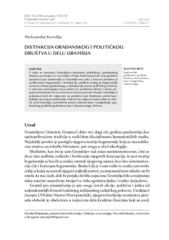Приказ основних података о документу
Distinkcija građanskog i političkog društva u delu Gramšija
The Distinction of Civil and Political Society in The Work of Gramsci
| dc.creator | Korolija, Aleksandar | |
| dc.date.accessioned | 2021-12-15T14:13:31Z | |
| dc.date.available | 2021-12-15T14:13:31Z | |
| dc.date.issued | 2021 | |
| dc.identifier.issn | 2683-5959 | |
| dc.identifier.uri | https://kritika.instifdt.bg.ac.rs/index.php/kc/article/view/67 | |
| dc.identifier.uri | http://rifdt.instifdt.bg.ac.rs/123456789/2471 | |
| dc.description.abstract | U radu se razmatra Gramšijevo shvatanje političkog i građanskog društva pozivajući se na kritiku Perija Andersona koji ovaj problem označava kao antinomiju u Gramšijevom radu. Osnovni problem je razlikovanje hegemonije i dominacije, prilikom kojeg se hegemonija svrstava unutar građanskog, a dominacija unutar političkog društva. U takvom razdvajanju nivoa dolazi do problema države i njene pripadnosti jednom od ova dva nivoa. Kroz ponovno čitanje Gramšija se pokušava doći do odgovora na problem koji Anderson primećuje i pridaje mu status antinomije. Kako bi se odgovor našao daje se celovit uvid Gramšija u predmete poput odnosa baze i nadgradnje, građanskog i političkog društva, kao i odnosa snaga i države. | sr |
| dc.description.abstract | This work considers Gramsci’s understanding of civil and political society. Following Perry Anderson’s critique, an attempt was made to find a distinction between civil and political society which wouldn’t have a form of antinomy that Anderson attributes to it. In this representation, the reader can find arguments for and against Anderson’s claims. This is not the last word on this subject, we rather hope it is a further illumina tion of the problem and its reactualisation. The concept of hegemony that Gramsci built at the level of civil society and that implies consent also has a place within this consideration, while political society provides domination. In that division of levels, a specific problem is the place of the state which fluctuates between civil and political society. With the concept of ethical state, Gramsci signifies the transition of state from political society and domination to civil society and consent. This problematic is engaged in a totalized manner with the presentation of Gramsci’s insights into the relation of base and superstructure, hegemony, political and civil society, relations of force and state. These concepts can offer a closer insight into Gramsci’s understanding of ideological hegemony only when they are considered in their unity. | sr |
| dc.language.iso | sr | sr |
| dc.publisher | Beograd: Institut za filozofiju i društvenu teoriju | sr |
| dc.rights | openAccess | sr |
| dc.rights.uri | https://creativecommons.org/licenses/by-nc-nd/4.0/ | |
| dc.source | Kritika: časopis za filozofiju i teoriju društva | sr |
| dc.subject | hegemonija | sr |
| dc.subject | građansko i političko društvo | sr |
| dc.subject | etična država | sr |
| dc.subject | baza i nadgradnja | sr |
| dc.subject | odnosi snaga | sr |
| dc.title | Distinkcija građanskog i političkog društva u delu Gramšija | sr |
| dc.title | The Distinction of Civil and Political Society in The Work of Gramsci | sr |
| dc.type | article | sr |
| dc.rights.license | BY-NC-ND | sr |
| dc.citation.issue | 2 | |
| dc.citation.volume | 2 | |
| dc.citation.spage | 273 | |
| dc.citation.epage | 298 | |
| dc.identifier.doi | 10.5281/zenodo.5732520 | |
| dc.type.version | publishedVersion | sr |
| dc.identifier.fulltext | http://rifdt.instifdt.bg.ac.rs/bitstream/id/8733/bitstream_8733.pdf |

